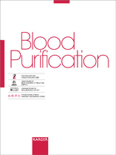
BLOOD PURIFICATION
Scope & Guideline
Championing Interdisciplinary Approaches in Blood Science.
Introduction
Aims and Scopes
- Advancements in Blood Purification Techniques:
The journal focuses on the development and evaluation of new blood purification methods, including hemodialysis, hemoperfusion, and therapeutic apheresis, addressing their efficacy, safety, and clinical applications. - Impact of Extracorporeal Therapies on Patient Outcomes:
Research articles often explore the influence of extracorporeal therapies on clinical outcomes in critically ill patients, particularly those suffering from sepsis, acute kidney injury, and other complex conditions. - Integrative Approaches to Kidney Care:
The journal promotes integrative strategies in managing kidney diseases, encompassing multidisciplinary approaches that combine nephrology, critical care, and innovations in technology and therapeutics. - Biomarkers and Predictive Models in Nephrology:
BLOOD PURIFICATION publishes studies on renal biomarkers and predictive models that assess the risk of complications, treatment responses, and long-term outcomes in patients undergoing kidney replacement therapies. - Education and Guidelines for Clinical Practice:
The journal also serves as a platform for sharing educational materials, clinical guidelines, and consensus statements that enhance the understanding and application of blood purification therapies in clinical settings.
Trending and Emerging
- Integration of Artificial Intelligence in Nephrology:
Recent articles highlight the increasing use of AI and machine learning models to enhance decision-making processes in renal replacement therapy, showcasing the potential for improved patient outcomes through data-driven approaches. - Personalized Medicine and Tailored Therapies:
There is a growing emphasis on personalized approaches to treatment, including tailored dialysis regimens and individualized anticoagulation strategies, which aim to optimize patient-specific outcomes. - COVID-19 Related Renal Implications:
The pandemic has led to a surge in research focused on the renal implications of COVID-19, including acute kidney injury, the role of renal replacement therapy, and the management of patients with concurrent COVID-19 and kidney disease. - Advancements in Hemoadsorption Techniques:
Emerging studies are increasingly investigating novel hemoadsorption techniques and their efficacy in treating conditions like sepsis and cytokine storms, indicating a trend towards more complex and multifaceted therapeutic approaches. - Exploration of Novel Biomarkers:
Research has increasingly focused on identifying and validating novel biomarkers for predicting outcomes in dialysis patients, which could enhance risk stratification and management strategies.
Declining or Waning
- Traditional Dialysis Modalities:
While still relevant, there has been a noticeable decrease in studies focusing on conventional dialysis techniques without the integration of newer technologies or adjunctive therapies. - Basic Science of Uremic Toxins:
Research dedicated to the fundamental biochemistry of uremic toxins has waned, as the focus has shifted more towards clinical applications and interventions rather than on the basic science behind these toxins. - Single-Center Studies:
There appears to be a decline in the number of single-center observational studies, as the journal increasingly favors multicenter trials and systematic reviews that provide broader insights and stronger evidence. - Longitudinal Studies on Quality of Life:
While important, longitudinal studies specifically focusing on quality of life measures among dialysis patients have become less frequent, possibly overshadowed by more immediate clinical outcome studies. - General Reviews without Novel Insights:
The journal has moved away from publishing general review articles that do not provide new insights or applications, favoring those that offer innovative approaches or significant advancements in the field.
Similar Journals

Blood Research
Unveiling Breakthroughs in Hematology for Global ImpactBlood Research, published by SPRINGER, is a premier journal dedicated to the multifaceted realm of hematology, serving as a crucial platform for disseminating innovative research findings and advancements in the diagnosis and treatment of blood-related disorders. With an ISSN of 2287-979X and an E-ISSN of 2288-0011, this journal is recognized for its commitment to scholarly excellence and impact in the field, currently holding a reputable Q2 ranking in the Hematology category as per the 2023 metrics. The journal spans from 2013 to 2024, providing a broad archive of quality research that is vital for researchers, healthcare professionals, and students alike. Although it is not an Open Access journal, it offers insightful contributions that enhance the understanding of hematological science, fostering the exchange of knowledge crucial for advancing patient care and clinical practices globally. The journal’s performance is underscored by its Scopus ranking in the 46th percentile, reflecting its significant role in the ongoing discourse in hematology.
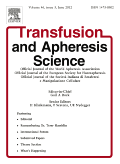
TRANSFUSION AND APHERESIS SCIENCE
Fostering Collaboration and Innovation in Blood HealthTRANSFUSION AND APHERESIS SCIENCE, published by Pergamon-Elsevier Science Ltd, serves as a pivotal platform for researchers and practitioners in the fields of hematology, transfusion medicine, and apheresis. With an ISSN of 1473-0502 and an E-ISSN of 1878-1683, this peer-reviewed journal boasts a respectable Q3 ranking in the Hematology category as of 2023, positioning it within the 45th percentile among its counterparts. Operating from the United Kingdom, it provides comprehensive insights into the latest advancements and methodologies in transfusion practices and apheresis technology, crucial for enhancing patient care and therapeutic strategies. The journal's scope, covering key developments from 1996 to 2024, allows for a deep exploration of historical and emerging trends within the discipline. Moreover, its open access options facilitate widespread dissemination of research findings, fostering collaboration and innovation in the scientific community. For those dedicated to advancing knowledge in hematology, TRANSFUSION AND APHERESIS SCIENCE represents an essential resource, bridging theory and practice in this vital area of healthcare.

Nephrologie
Transforming kidney health through collaborative research.Nephrologie, published by Springer Heidelberg, is a vital addition to the field of nephrology, providing a dedicated platform for the dissemination of cutting-edge research and clinical practices in kidney health. With its ISSN 2731-7463 and E-ISSN 2731-7471, this journal facilitates open access to a range of articles aimed at enhancing understanding and treatment of renal disorders. Located in Germany, Nephrologie is recognized for its commitment to advancing nephrological knowledge despite being currently categorized in the Q4 quartile and holding a Scopus rank of #80/81 within its field, indicating its emerging potential in the academic landscape. Operating from Tiergartenstraße 17, D-69121 Heidelberg, Germany, the journal encompasses a diverse scope that includes original research, review articles, and clinical studies, fostering a collaborative environment among researchers, healthcare professionals, and students. As it converges between 2022 and 2024, Nephrologie positions itself as a crucial resource for those committed to improving renal patient care and outcomes.
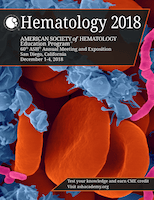
Hematology-American Society of Hematology Education Program
Advancing Hematology through Expert EducationHematology-American Society of Hematology Education Program is a premier peer-reviewed journal dedicated to advancing the field of hematology through comprehensive educational content. Published by the American Society of Hematology, this journal plays a crucial role in disseminating knowledge to researchers, clinicians, and students in hematology and related disciplines. With an impressive Q1 status in the field, it ranks among the top journals at the forefront of hematological research, as evidenced by its 60th percentile ranking in Scopus' Medicine - Hematology category. Although it does not offer open access, the journal provides invaluable insights and educational resources from leading experts, focusing on the latest advancements, treatment protocols, and evolving understanding of blood disorders. Covering a wide range of topics, from basic research to clinical applications, this journal is essential for anyone seeking to deepen their expertise and stay informed on the latest developments in hematology. For further engagement, readers can access insightful articles published since 2001, ensuring a rich repository of knowledge for ongoing research and clinical excellence.
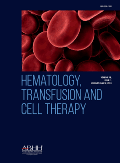
Hematology Transfusion and Cell Therapy
Innovating the future of blood disorder management.Hematology Transfusion and Cell Therapy, published by Elsevier, is a leading Open Access journal dedicated to advancing the fields of hematology, immunology, and transfusion medicine. Since its establishment in 2018, this journal has provided a vital platform for sharing innovative research and clinical advancements in the management of blood disorders and cellular therapies. Based in Brazil, it attracts a global audience, facilitating access to high-quality research that influences clinical practice and policy. With a current impact factor that places it in the Q3 category for both hematology and immunology as of 2023, the journal is recognized for its rigorous peer-review process and commitment to disseminating significant findings. By featuring a diverse range of articles, from original research to reviews, Hematology Transfusion and Cell Therapy aims to foster collaboration and knowledge sharing among researchers, professionals, and students alike, empowering them to tackle emerging challenges in their fields.

Journal of Blood Medicine
Unlocking Potential: Transforming Knowledge into Practice in Blood MedicineThe Journal of Blood Medicine, published by DOVE MEDICAL PRESS LTD, stands as a vital resource in the field of hematology, focusing on the latest research developments and clinical advancements in blood medicine. With an impact factor reflective of its growing relevance, this open-access journal has been delivering quality scholarly work since 2010, ensuring that critical research is readily available to the global scientific community. The journal operates under an open-access model, further enhancing its dissemination and accessibility to researchers, professionals, and students alike. In the 2023 rankings, it secured a Q3 category status within hematology and achieved a commendable 76th rank out of 137 in Scopus listings, indicating its commitment to quality and innovation in this specialized area. Located in New Zealand, the journal's diverse topics encompass clinical research, treatment modalities, and emerging therapies, contributing significant insights vital for shaping future advancements in blood medicine.
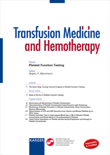
TRANSFUSION MEDICINE AND HEMOTHERAPY
Advancing transfusion science for better patient outcomes.TRANSFUSION MEDICINE AND HEMOTHERAPY, published by KARGER, is a prominent journal dedicated to advancing the fields of hematology and transfusion medicine. With an ISSN of 1660-3796 and E-ISSN 1660-3818, this esteemed journal has been a valuable resource for researchers and clinicians since its inception in 1973, with significant publication phases continuing into 2024. It currently holds a Q2 ranking in Hematology and a Q3 ranking in Immunology and Allergy, reflecting its impact and relevance in these critical fields. The journal features original articles, reviews, and clinical studies, presenting cutting-edge research that aids in the development of effective therapies and enhances patient care. Open access options are available, ensuring that crucial findings are accessible to a broad audience. As an important platform for dialogue and advancement in transfusion science, TRANSFUSION MEDICINE AND HEMOTHERAPY supports the global health community's efforts to improve treatment outcomes and foster innovation in medical practices.
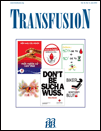
TRANSFUSION
Transforming Hematology Through Innovative ResearchTRANSFUSION is a prestigious peer-reviewed journal published by WILEY, dedicated to advancing the field of hematology and transfusion medicine. With an ISSN of 0041-1132 and an E-ISSN of 1537-2995, this journal serves as a vital resource for researchers and professionals alike, delivering high-quality studies and reviews that impact clinical practice and blood management strategies. The journal enjoys a strong reputation, evidenced by its impressive Q1 ranking in hematology and Q2 in both immunology and allergy as of 2023. Covering foundational aspects from 1958 to 2024, TRANSFUSION not only provides valuable insights but also fosters collaboration and innovation in understanding the complexities of blood donation, transfusion practices, and immunological responses. With its significant contributions to the scientific community, this journal is essential for those seeking to stay at the forefront of research and advancements in transfusion science.

CLINICAL HEMORHEOLOGY AND MICROCIRCULATION
Innovating Research for a Healthier TomorrowClinical Hemorheology and Microcirculation, published by IOS Press, is a distinguished journal dedicated to advancing the scientific understanding of blood flow mechanics and microcirculatory phenomena. Since its inception in 1991, the journal has been pivotal in bridging the fields of cardiology, hematology, and physiology, as evidenced by its placement in the Q3 quartile across several categories in 2023. Positioned in the vibrant academic landscape of the Netherlands, Clinical Hemorheology and Microcirculation offers valuable insights to researchers and practitioners alike, enriching their knowledge and fostering innovation in clinical practices. With an ISSN of 1386-0291 and an E-ISSN of 1875-8622, the journal serves as a vital platform for disseminating high-quality research and reviews that explore the intricate dynamics of blood viscosity and microvascular function, essential to both health and disease. As readers delve into the journal, they will access rigorous studies that not only enhance theoretical understanding but also pave the way for potential clinical applications, making it a crucial resource for those invested in the future of cardiovascular and hematological research.
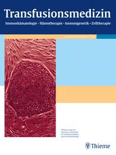
Transfusionsmedizin
Uniting expertise to improve blood transfusion safety and efficacy.Transfusionsmedizin is a premier journal dedicated to the field of transfusion medicine, published by the renowned GEORG THIEME VERLAG KG. With an ISSN of 2191-8805 and an E-ISSN of 2191-8813, this journal serves as a vital platform for disseminating cutting-edge research and clinical advancements in blood transfusion practices. Although it operates under a subscription model, the journal is committed to high-quality peer-reviewed content that addresses contemporary challenges and innovations in transfusion therapy. By fostering dialogue among researchers, clinicians, and students, Transfusionsmedizin aims to advance patient care and enhance the safety and efficacy of transfusion practices globally. Its contributions are essential for professionals engaged in transfusion science, hematology, and related medical fields, solidifying its reputation as a critical resource for staying abreast of the latest developments in transfusion research.